
New towing service for breakdown vehicles— NRSA Director-General
The National Road Safety Authority (NRSA) has started discussions with insurance companies for the deployment of an effective towing services to clear broken down vehicles from the roads as soon as practicable.
The move is to prevent road crashes and fatalities that emanate from abandoned vehicles on the roads.
Advertisement
It will also help to promote safety on the roads by way of providing a reliable towing service to remove broken down vehicles swiftly, as well as help prevent oil from leaking onto the roads which destroyed them.
The Director-General of the NRSA, Mrs. May Obiri-Yeboah, made this known to the Daily Graphic when the paper contacted the authority to find out what steps were being taken to reduce the increasing road crashes on the roads.
She said the NRSA was determined to roll out an effective towing service in the country for which reason it had started engaging the National Insurance Commission (NIC) and the Ghana Insurance Association (GIA) on the matter.
"A number of insurance companies have shown real interest in partnering us to roll out vehicle towing service. The dialogue is still on because there is no decision yet," she said, when asked when the initiative would start.
However, she said the NRSA was determined to continue with the dialogue to ensure that the towing service was rolled out as soon as practicable.
Mrs. Obiri-Yeboah added that the authority had engaged and continued to engage other transport sector stakeholders on a towing service for abandoned vehicles, "and the response has so far been positive."
Law on broken down vehicles
The Road Traffic Regulations, 2012 (L.I 2180) give specific directives on the movement of breakdown vehicles.
Regulation 102 (1) of L.I 2180 states: “An owner of a vehicle or person in charge of a motorcycle or trailer who causes or permits the motorcycle or trailer which breaks down on the road to be left on the road shall give notice to the nearest police station or authorise a towing service provider within an hour if the broken down vehicle or trailer is located within a built-up area; and within two hours if the broken down vehicle or trailer is within a place other than a built-up area.
In spite of the law, some breakdown vehicles are left on the road for many days and, sometimes, months without being cleared.
Following the loss of many lives in crashes relating to abandoned vehicles, the NRSA, which was then a commission, announced that effective July 1, 2017, vehicle owners were required to pay a mandatory road safety fee each time they went to the Driver and Vehicle Licensing Authority (DVLA) to renew their roadworthy certificates.
In its explanation, the NRSA said the service was to be run such that within one to two hours after a vehicle broke down, a towing vehicle would be available to do the towing.
Per the details, owners of motorbikes were to pay GH¢10 annually, while owners of non-commercial vehicles pay GH¢20.
For commercial vehicles, taxi owners were expected to pay GH¢40; mini buses, GH¢80, while heavy-duty trucks also pay between GH¢80 and GH¢200 annually, depending on their tonnage.
In addition, foreign vehicles that were not required to go to the DVLA for road worthy certification were to be made to pay the required fees at the points of entry.
The NRSA had clarified further that owners of motorbikes had been captured because the law enforcing the collection of the fee, LI 71 (8) of 2012, defined vehicles to include motorbikes.
When the NRSA announced that policy, it said modalities and contractual arrangements with Road Safety Management Company Limited (RSMCL), a private company, to implement a nationwide towing service to clear all abandoned vehicles, had been completed.
The RSMSL had then acquired 118 trucks for the national towing service but the trucks were not put to use because the policy was aborted following protests by various stakeholders.
Assurance
Mrs. Obiri-Yeboah said the previous arrangement might have failed because the engagement of stakeholders was not thorough enough for everyone to buy into the idea.
Guided by that precedence, she said the NRSA was not hastening in coming out with another initiative that would be resisted.
She observed that with its new status as an authority, the NRSA would do everything possible to enforce the law on abandoned vehicles to save lives on the roads.
In that regard, she directed all owners of vehicles to strictly comply with Regulations 102(1) of L. I 2180 by ensuring that they promptly arrange to tow the vehicles anytime they broke down on the road.
"I am looking forward to the towing service to happen, but for now, it is the responsibility of owners of broken down vehicles to inform the police about their vehicles and ensure that they are towed as a matter of necessity, " she stressed.
GRTCC's support
Meanwhile, the Ghana Road Transport Coordinating Council (GRTCC) has described the NRSA move to get a reliable towing service to address road crashes from abandoned vehicles as welcoming news.
The General Secretary of the GRTCC, Mr. Emmanuel Osei Yeboah, said the council was ready to support the initiative as it would bring sanity to the country's roads.
He also called for investment in road infrastructure and retooling of the Motor Traffic and Transport Department (MTTD) of the Ghana Police Service to boost their capacity to enforce road traffic regulations.



